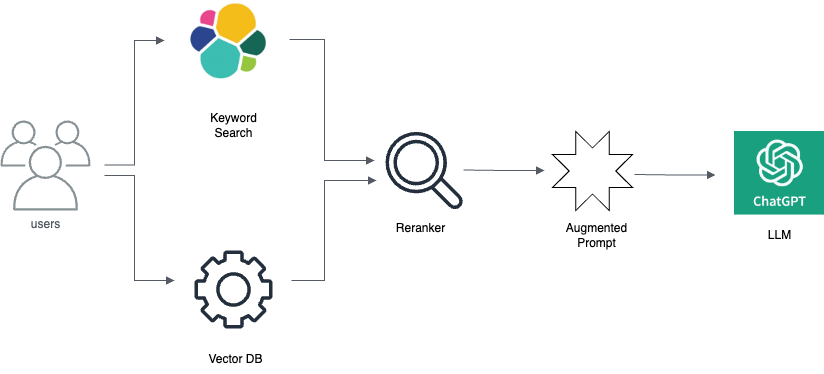
5 Best AI Sales Chatbots to Boost Conversions

With more companies offering faster, more personalized customer experiences, customers are expecting instant responses and simple sales processes.
If your competitors are using AI chatbots to close deals faster, recover more sales, and engage customers better, you may find yourself losing business simply because your process is too slow.
An AI sales chatbot is a digital assistant that answers customer questions, qualifies leads, and even closes deals. Companies that use AI-powered chatbots see higher conversions, shorter sales cycles, and a more predictable pipeline.
In this article, we will explore how AI sales chatbots work, their impact on lead generation, and why they are essential for modern sales teams. Our lead generation chatbot solution helps businesses capture and qualify leads automatically around the clock.
If you're looking for a smarter way to qualify leads and close deals faster, an AI sales chatbot might be the solution you need.
What is an AI Sales Chatbot?#
An AI sales chatbot is a virtual assistant built to automate parts of your sales process. It engages website visitors in real time, answers product and pricing questions, and helps qualify leads so your sales team focuses on closing deals. Unlike basic bots, a sales chatbot uses conversational intelligence and integrations with sales tools to move prospects forward — scheduling meetings, offering suggestions, or handing off to a human when needed. It’s available 24/7, never misses a lead, and can speed up response times. Think of it as a first-level seller that works behind the scenes, driving conversions without asking for more headcount.
Capabilities and Limitations of AI Sales Chatbots#
AI sales chatbots powered by artificial intelligence (AI) and natural language processing (NLP) are reshaping customer communications. They help engage leads instantly, qualify prospects, and even close some deals.

However, they cannot replace human sales reps in every situation.
You will likely be disappointed if you expect a chatbot to handle complex negotiations or build long-term client relationships. But, if you use it strategically, it can make your sales process faster, more efficient, and more profitable.
Let’s break down what an AI sales chatbot can and cannot do so that you can set realistic expectations.
What These AI Agents Can Do#
Unlike human sales reps who work specific hours, an AI chatbot is available 24/7, making sure no lead goes unnoticed. Studies show that companies responding to leads within five minutes are 30 times more likely to convert them.
A chatbot makes this possible by instantly answering questions, providing product recommendations, and guiding visitors toward making a purchase or booking a call.
Another key advantage is lead qualification. Chatbots ask targeted questions to determine if a potential customer is a good fit rather than spending time on cold leads. This process allows sales reps to focus only on high-intent buyers, reducing time wasted on unqualified leads.
AI chatbots also improve customer engagement by automating follow-ups. Many potential buyers drop off simply because they are not contacted at the right time.
They solve this by sending reminders, personalized emails, and special offers to keep leads interested and engaged throughout the customer journey.
When connected through an application programming interface, chatbots can sync with CRMs Systems like Zendesk Sell, email platforms, and calendars. This kind of integration is useful for CRM tools where every interaction can be tracked and managed from one place.
For e-commerce and fulfillment-based businesses, AI chatbots are also being used to handle order tracking. It gives customers real-time shipment updates while reducing pressure on human agents.
What It Can't Do#
While AI sales bots are great at handling routine sales tasks, they are not a replacement for human intuition and emotional intelligence.
An AI chatbot will not be enough if your sales process relies on relationship-building, trust, and long-term partnerships.
Complex deals, especially in high-ticket B2B sales, require human sales professionals who can adapt their approach based on customer emotions, business goals, and negotiation strategies.
Chatbots may also struggle with handling nuanced objections. They can answer basic questions about pricing, features, or comparisons. However, they do not always understand the deeper concerns a potential buyer might have.
If a prospect says, “I love your product, but my CFO isn’t convinced,” a chatbot cannot navigate that conversation as well as a skilled salesperson. In such cases, the chatbot should transfer the conversation to a human rep who can provide a persuasive, tailored response.
They also lack true emotional understanding. While they can detect sentiment to some extent, they do not genuinely understand frustration, excitement, or skepticism. A skilled human sales rep can read between the lines and adjust their tone accordingly.
B2B sales chatbots cannot fully replace human-to-human trust-building. In industries like financial services, healthcare, and real estate, customers often want reassurance from a real person before making important decisions.
Find the Right Balance#
The most successful sales teams use AI chatbots as assistive tools rather than standalone solutions. When properly integrated, these chatbots handle routine, tedious tasks, speed up the qualification process, and improve overall sales efficiency, which leads to more clarity in the sales pipeline.
They also help identify trends across buyer behaviors and common objections that allows sales leaders to refine messaging and strategies. To build a comprehensive chatbot marketing strategy that integrates with your sales process, follow our step-by-step guide.
Still, AI chatbots work best when paired with human reps who can guide, listen, and build real connections. When you combine automation with empathy, you create a sales experience that drives real customer engagement and long-term revenue growth.
5 Best Sales Chatbots#
| Chatbot | Best For | Features | Pricing |
|---|---|---|---|
| Denser.ai | Semantic AI for sales & customer support | No-code setup, semantic AI, learns from chats, document support, content creation, free trial available | Free plan + paid tiers |
| Drift | Personalized lead engagement | Salesforce integration, real-time chat, lead identification, video messages | Premium pricing |
| Intercom | Real-time customer communication | Instant messaging, ticket management, analytics, automation | Higher cost plans |
| Tidio | Easy live chat + email/chatbot combo | Simple setup, tailored plans, streamlined management tools | Free + paid options |
| Zendesk Chat | Fast, basic website chat | Auto-replies, status options, satisfaction scores, agent controls | Tiered pricing (per agent) |
Several sales chatbot tools stand out for their ability to enhance sales team performance:
Denser.ai#
Denser.ai is reshaping how sales teams talk to their customers using semantic AI. Sales teams can have deeper, more meaningful chats and identify what customers are looking for.
What makes Denser.ai stand out? This intuitive AI tool is the best sales chatbot among other chatbot solutions.
It handles various tasks, whether helping with tech issues, summing up documents, or creating content. And the best part? It learns from every chat, gradually getting better at helping your customers.
Denser.ai has a free plan for anyone wanting to try its basic features. This trial includes:
- 1 DenserBot
- 200 queries
- Space for 100 webpages or 50MB of documents
This lets you test the tool without spending anything and see how it works before deciding on a paid plan.
Setting up Denser chatbots is surprisingly simple -- no coding needed. Just provide your website URL or the files you want it to learn from, and you're good to go.
Drift#
Drift is a chat service that uses AI to learn from and understand customers, making conversations personalized and friendly.
Pros#
- Blends with Salesforce for instant data sharing.
- Automatically identifies and engages potential leads.
- Offers real-time, personalized chat interactions.
- Enables sales teams to create and share custom video messages.
Cons#
- High pricing
- Needs additional integrations
- Lacks multilingual support
Intercom#
Intercom is a customer service software that helps businesses easily talk to their customers using messages and automated tools.
Pros#
- Quick, real-time help directly from customer support.
- Manage and direct several tickets or chats at once.
- Detailed analytics on each support agent's effectiveness.
Cons#
- Higher cost with room for more features in basic packages.
- Complex customer segmentation.
Tidio#
Tidio combines a live chat application with chatbot functionality, including email features for comprehensive customer communications.
Pros#
- Easy-to-navigate management tools.
- Plans tailored to avoid unnecessary feature costs.
- Simplified chatbot setup and operation.
Cons#
- Users miss responses if they leave the page.
- Chat updates only with the page open.
Zendesk Cha#
Zopim Live Chat enables real-time conversations with website visitors through a chat bar at the bottom. Visitors can easily start chatting by clicking on the widget.
Pros#
- Set up automatic replies for idle or reconnected chats.
- Choose from Available, Away, or Invisible to keep customers informed.
- Agents see chat satisfaction scores immediately, with admin control over access.
Cons#
- Different colors for each chat could prevent response mix-ups.
- A resettable timer could help agents manage their handling time better.
- Additional statuses like Break 1, Break 2, and Meeting would enhance management.
How AI Sales Chatbots Are Used in Different Industries#
AI sales chatbots have become an integral part of modern sales strategies, but there are still misconceptions about their capabilities.
They work across different industries, engaging leads, qualifying prospects, and even closing sales. Businesses that use them strategically gain a competitive edge by reducing response times and converting leads faster.
Here’s how different industries are using AI sales chatbots to their advantage.
E-Commerce#
Online stores use AI chatbots to guide customers, suggest products, and recover lost sales. Rather than forcing shoppers to browse through endless pages, chatbots provide personalized recommendations based on past purchases or browsing history.
Many shoppers add items to their cart but never complete the purchase. E-commerce chatbots detect abandoned carts and send messages to bring customers back. Some even offer discount codes or free shipping incentives to encourage them to check out.
E-commerce retailers also use chatbots to handle return requests, provide shipping updates, and answer product questions instantly. It reduces the need to automate customer support through human agents.
Financial Services#
Banks, insurance companies, and loan providers use AI sales chatbots to simplify customer decision-making. People can chat with a bot to compare different loan options, credit cards, or insurance policies instead of visiting a branch or making phone calls.
For example, a chatbot can ask a user about their income, spending habits, or coverage needs and then suggest the best financial product based on their answers.
Fintech chatbots also help with fraud alerts, loan applications, and account balance inquiries, reducing the load on human support teams and delivering faster results.
B2B Sales#
For B2B companies, AI chatbots act as the first point of contact with potential clients. Instead of waiting for a sales rep to respond, a B2B chatbot asks qualifying questions such as company size, budget, and specific needs.
This process helps filter out low-quality leads and sends only the most relevant ones to the sales team, uncovering high-value sales opportunities. See how leading companies like Oracle, IBM, and Salesforce use chatbots in our B2B chatbot examples guide.
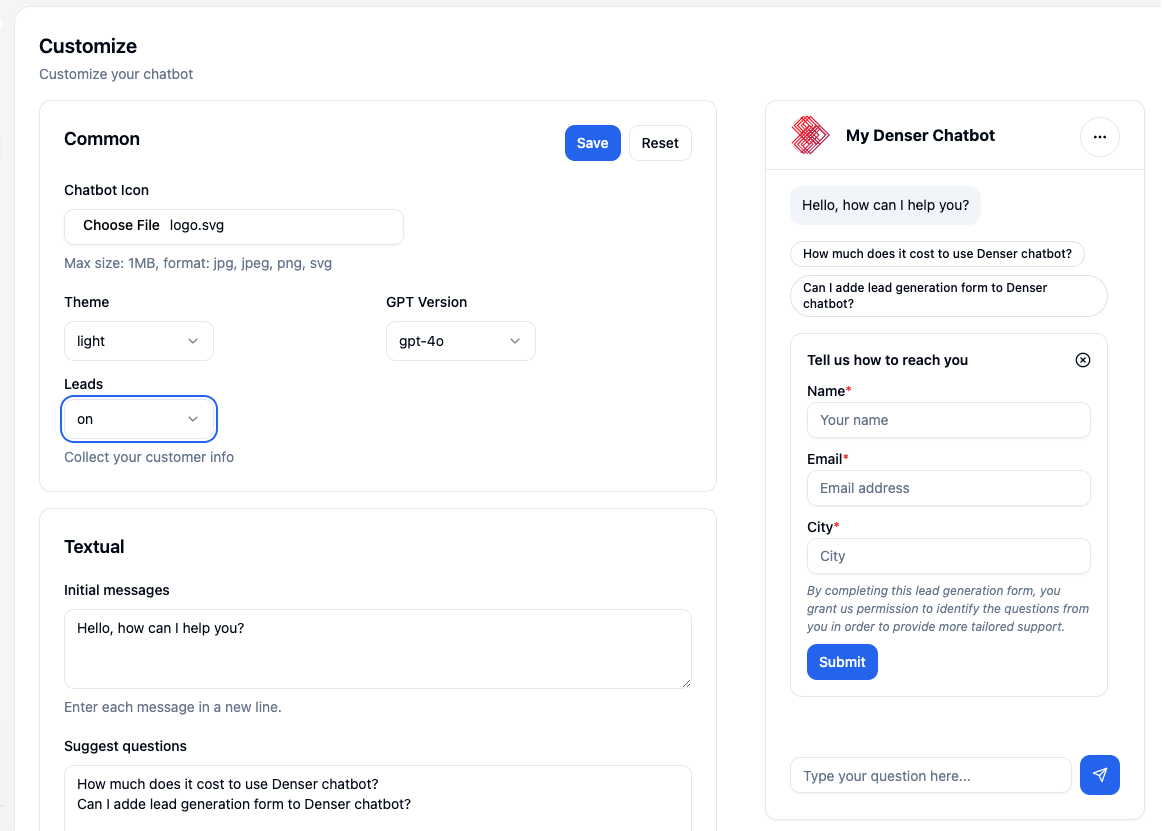
Businesses using AI chatbots for lead qualification save hours of manual work each week and increase their response speed to potential clients.
Chatbots also schedule sales calls and product demos automatically, which eliminates the hassle of back-and-forth emails. Their ability to automate tasks saves time while keeping prospects engaged.
Travel & Hospitality#
Travel companies and hotels use AI chatbots to help customers book flights, hotel rooms, and vacation packages. Instead of searching through multiple channels, travelers can chat with an assistant that finds the best options based on budget and preferences.
Some chatbots even provide real-time flight updates, answer itinerary questions, and suggest personalized travel recommendations. They offer real-time assistance that improves the travel planning experience.
Hotels are also seeing benefits. Chatbots help with room bookings, special requests, and common inquiries, all without guests needing to make phone calls or wait in line. This experience contributes to boost conversions by reducing friction during booking.
Steps to Build an Effective AI Sales Chatbot#
Many companies invest in chatbot technology with the hope of increasing conversions, recovering lost sales, and shortening the buying process. However, the real impact depends on how the chatbot is used, how well it’s set up, and whether it fits into the overall sales strategy.
To make sure your chatbot drives revenue and improves your sales process, you need to follow the right steps. Here’s how to build an AI sales chatbot that helps your business grow.
Step #1: Define Your Chatbot’s Purpose#
Before launching an AI agent, ask yourself: What problem am I solving?
A chatbot should serve a clear function within your sales process. Some common use cases include:
- Qualifying leads: Asking key questions to filter out low-intent customers
- Booking sales meetings: Schedule appointments automatically
- Handling objections: Providing instant answers to pricing or feature questions
- Upselling and cross-selling: Recommending additional products based on behavioral insights
- Recovering abandoned carts: Sending reminders and discounts to hesitant buyers
Some businesses try to make their chatbots handle everything, which often leads to poor results.
The best approach is to focus on one or two key functions first, then expand based on performance.
If your sales team spends too much time answering the same basic questions, start with a chatbot that delivers effective responses. If you struggle with lost leads, use a chatbot to follow up and re-engage prospects through personalized messaging.
Step #2: Choose the Right AI Chatbot Platform#
Not all chatbot platforms are built for sales-driven conversations. Many are designed for customer support rather than guiding leads toward a purchase.
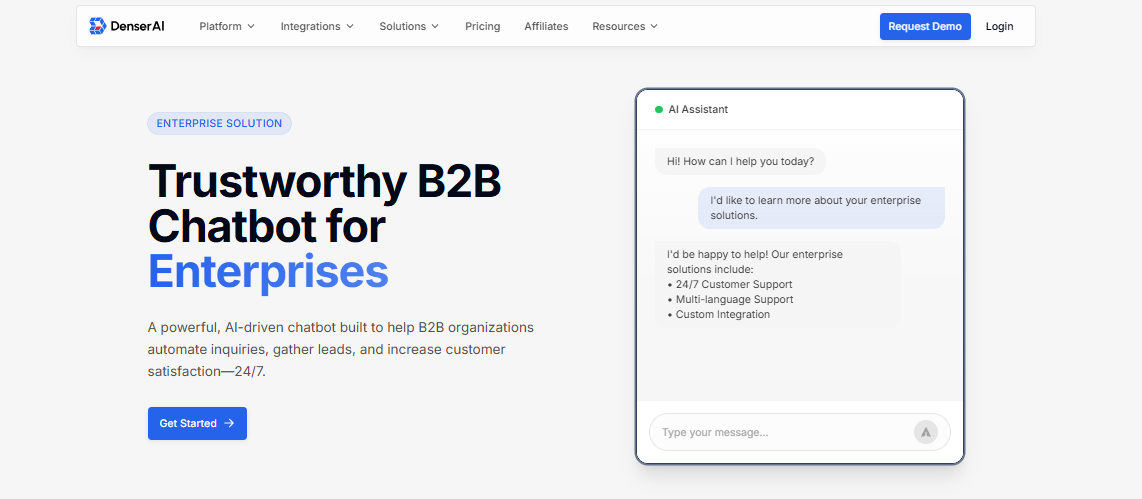
Unlike general-purpose chatbots, Denser is designed for B2B sales, offering advanced AI capabilities to engage, qualify, and convert leads better.
Intelligent Conversations#
Denser is powered by advanced AI that understands complex B2B queries and responds with accurate, contextual information. It doesn’t just provide scripted answers. It pulls customer data from your business knowledge base to ensure meaningful conversations that align with your sales strategy.
24/7 Lead Generation and Qualifying Prospects#
Your customers don't have to wait for a sales rep to respond. Denser proactively engages website visitors and guides them through the sales process.
It asks the right questions, qualifies leads based on their responses, and seamlessly hands off high-intent prospects to your sales team.
With Denser, your business captures leads around the clock to make sure no opportunity is lost, no matter the time zone.
Multi-Language Support#
Language barriers can slow sales if your business deals with international clients. Denser solves this with automatic translation capabilities.
It allows you to communicate with prospects in multiple languages and makes it easier to convert leads from different regions without hiring multilingual sales reps. It creates a more personalized experience that builds trust.
Quick, Seamless Integration#
Denser integrates with your CRM, ERP, help desk, and other essential B2B tools for a smooth data flow across your entire sales ecosystem.
If you're using Salesforce, HubSpot, or other enterprise platforms, Denser syncs all customer interactions so your sales team has the full picture before following up with a lead. Whether it’s email, chat, or social media platforms like Facebook Messenger, Denser keeps all your touchpoints aligned.
Sales Funnel Optimization#
Denser provides detailed insights into chatbot performance, lead generation metrics, and customer satisfaction scores.
These chatbot analytics help you track how many leads are converting, where prospects are dropping off, and how chatbot interactions are affecting your bottom line. With these actionable insights, you can refine your strategy over time.
Scalable Sales Automation#
As your business grows, so does the volume of leads and customer inquiries. Denser’s scalable AI solution makes sure that no matter how many interactions you receive, your chatbot continues to deliver fast, high-quality responses.
Whether handling 10 conversations or 10,000, Denser maintains consistent engagement with every prospect. Its chat widget makes it easy to install and run on your website.
Sign up for a free trial and see how Denser can transform the way you sell.
Step #3: Train Your AI Chatbot for Human-Like Interactions#
An AI chatbot learns from the data it’s trained on. If you want it to sound natural and persuasive, it needs to be trained on real customer conversations.
You can start by gathering past sales calls, email exchanges, and chat transcripts. Identify the most common customer questions, objections, and decision-making factors. Then, use this data to create chatbot responses that feel personal and relevant.
For example, if a customer asks about pricing, instead of giving a generic response, the chatbot should offer real value:
- Customer: “Your product seems expensive.”
- Chatbot: “I understand. Many customers felt the same way at first, but after using it, they saw an increase in conversions by 30%. Would you like to see a case study?”
This kind of response builds trust and keeps potential buyers engaged with personalized messaging that reflects real experience.
Step #4: Integrate Your Chatbot With Sales Tools#
For an AI chatbot to drive real sales, it needs to be connected to your CRM, email automation, and sales tools. Without proper integration, the chatbot will collect leads but won’t help move them through the pipeline.
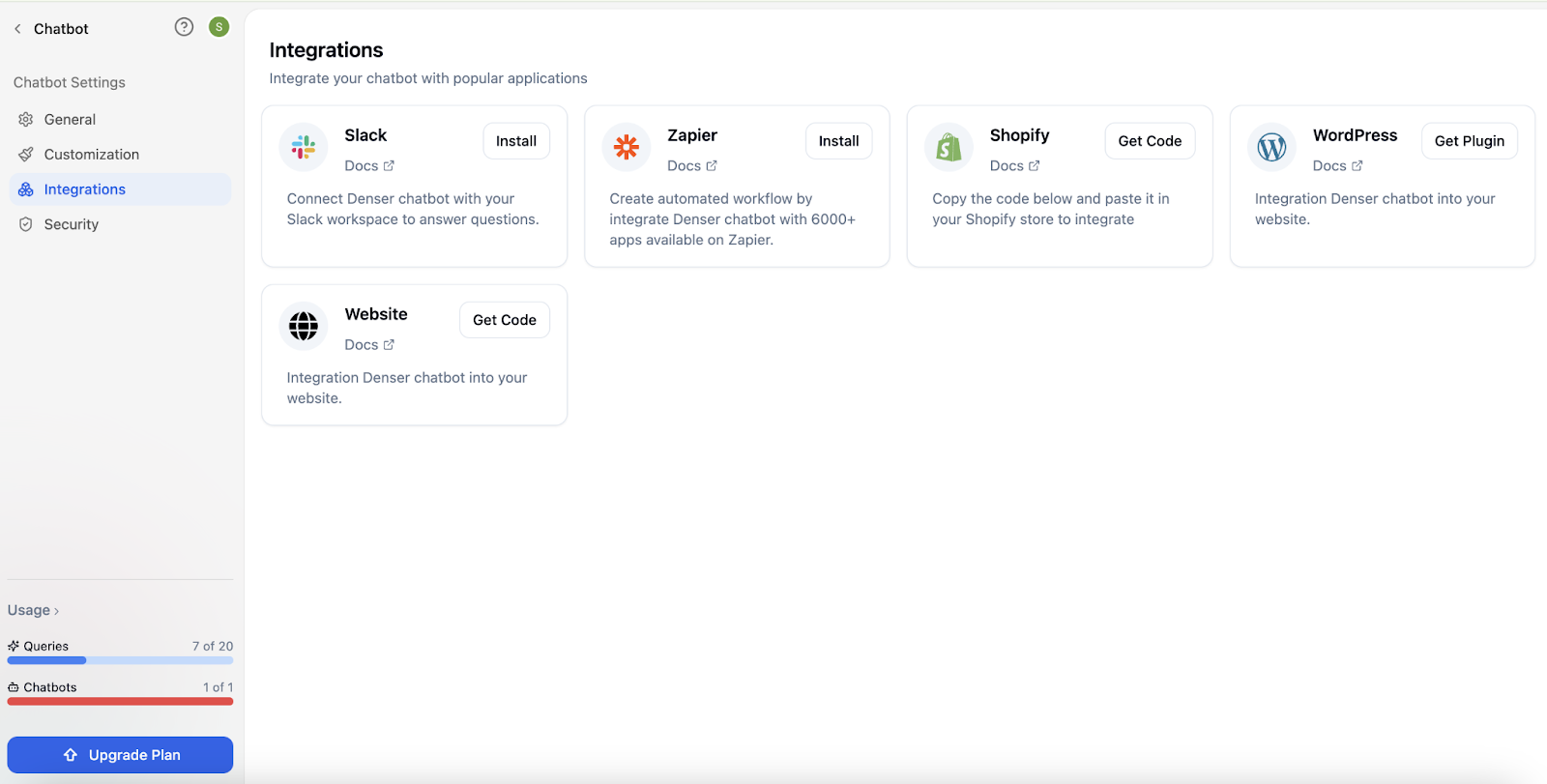
When integrated properly, the chatbot can send qualified leads to your CRM automatically, schedule appointments, or trigger follow-up emails based on user behavior.
If a lead interacts with the chatbot but doesn’t convert, the chatbot can automatically follow up later with an offer or relevant content. With the right data syncing, the chatbot becomes part of your full marketing efforts.
Step #5: Make the Chatbot Feel Like a Real Conversation With Potential Customers#
Many chatbots fail because they sound robotic. Customers don’t want to feel like they’re talking to a machine.
To create a chatbot that keeps people engaged, short and natural responses need to be provided instead of long paragraphs. You have to match your brand’s tone so it feels like a seamless part of your sales team.
It's also important to handle objections conversationally instead of giving generic answers. Customers will lose interest quickly if a chatbot is too formal or scripted.
The best conversational AI chatbots guide users through the sales process naturally to make it easy for them to make a purchase decision.
Step #6: Test and Improve Over Time#
No chatbot is perfect when it first launches. The best AI sales chatbots improve over time by learning from past interactions.
You should regularly check chatbot performance to see the following:
- Where leads are dropping off in conversations
- Which responses are working, and which ones need to be updated
- Whether the chatbot is handing off leads at the right moment
If customers frequently ask the same question and don’t get a clear answer, update the chatbot’s responses. If leads aren’t converting, adjust the conversational flows to make them more engaging and persuasive.
If you’re offering a product catalog, you might even integrate a product finder to guide buyers directly to what they need.
Monitoring how information collected is used throughout the process will help you optimize future interactions and make sure the bot is guiding visitors who are clearly showing interest.
Verdict: Will You Let AI Take Over Your Sales Game?#
The answer depends on how well you implement AI and whether you choose the right chatbot solution.
While AI won’t replace human sales reps entirely, it works alongside your team to automate repetitive tasks, engage leads faster, and improve the overall customer experience.
Customers expect instant responses. If your competitors are closing deals faster and qualifying leads automatically, you could be losing business simply because your process is too slow.
If your business depends 100% on personal relationships and custom pricing negotiations, AI alone won’t be enough. However, Denser can still assist by handling initial conversations and supporting your sales team as the first line of contact.
With the right strategy, an AI chatbot solution becomes a real driver of sales growth. It helps your team collect information, respond faster, and convert better without increasing headcount.
If you're ready to scale your sales and automate the tasks that slow you down, a chatbot like Denser is the best chatbot to start with. Backed by real customer testimonials, Denser delivers results businesses can trust!
Fast-Track Your Sales Process With Denser AI-Powered Chatbots#
Your sales team is doing its best, juggling follow-ups, demo requests, and lead qualification, but there’s only so much they can handle. Every delayed response, missed inquiry, and lost follow-up costs you revenue.
An AI sales chatbot fixes this problem by engaging leads instantly. It qualifies prospects in real time and hands off serious buyers to your sales team.
Denser’s AI chatbot works around the clock to answer questions, nurture leads, and book sales calls. It keeps prospects engaged and prevents lost opportunities without adding extra work to your team.
Sales teams that respond faster close more deals. Denser helps you capture more leads, move them through the funnel, and increase conversions without delays. Stop letting slow response times hurt your sales.
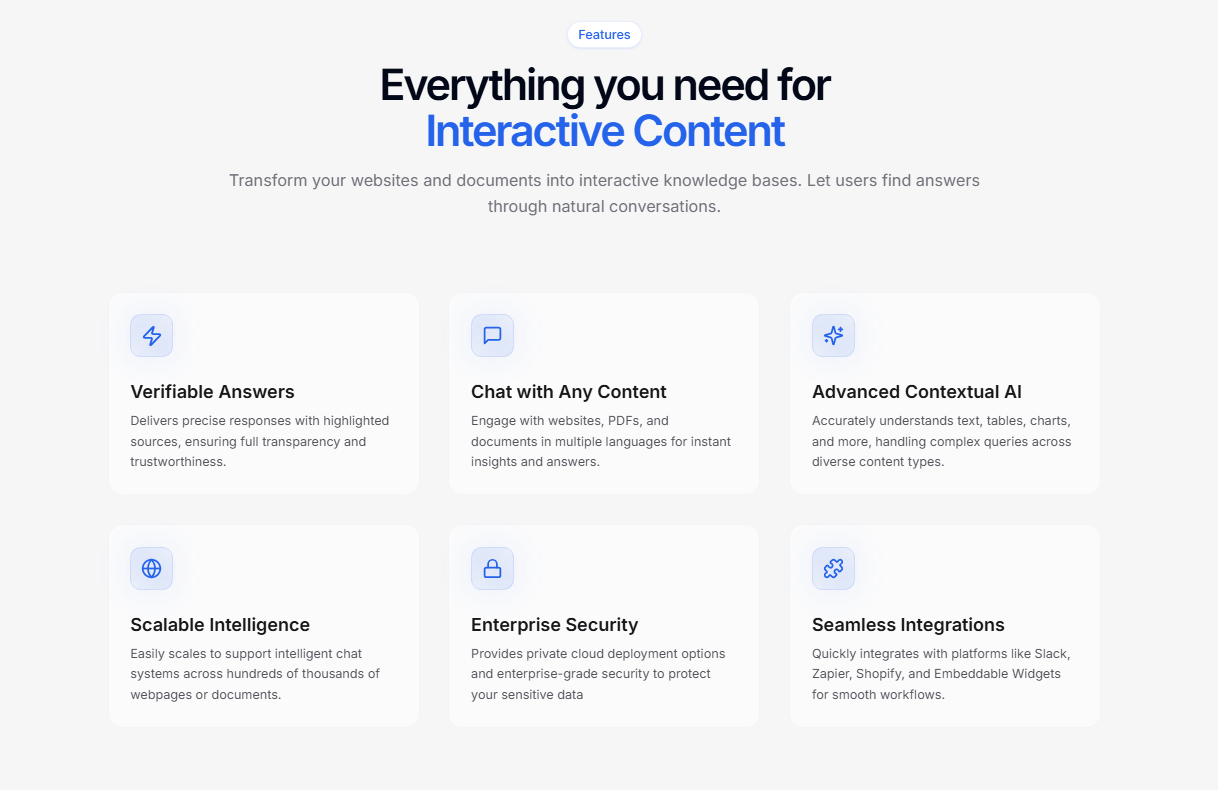
Sign up for a free trial or schedule a demo now and see how Denser can help you close more deals with less effort.
FAQs About AI Sales Chatbot#
Do AI chatbots increase sales?#
Yes, AI chatbots help increase sales by responding to leads instantly, guiding customers through the buying process, and automating follow-ups.
Businesses using AI chatbots see higher conversion rates because they engage potential buyers at the ideal time. These tools are key to attracting more customers without adding pressure to your sales team.
What is the best AI for sales?#
The best AI for sales is one that aligns with your business process, integrates with your tools, and delivers measurable results. Denser stands out for its performance, smart lead handling, and ability to streamline sales workflows using real-time customer information.
What is an AI sales bot?#
An AI sales bot is a useful tool that automates parts of the sales process such as lead qualification, follow-ups, and scheduling.
It engages prospects in real time, answers product-related questions, and ensures no opportunity is missed that allows human reps to focus on high-value deals.
Can you use AI for sales?#
AI is being used across industries to improve sales performance. With the power of machine learning, AI sales bots learn from past interactions to refine responses, better qualify leads, and convert prospects faster.
When implemented correctly, it becomes an extension of your sales team.